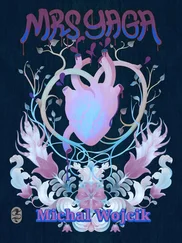“Say: Esme, I am sorry. This will never happen again.” She began to laugh. “Can you imagine what Bruce must have thought? Good thing he was drunk. Good thing, for me—” She looked at Martin with reproach. “Get him home, okay?”
“I’ll do that now.”
“You’ll need the sleds. For them both, I think.”
Martin nodded and left, but at the door, Esme said, “Be careful.” It was cold out — the wind panned across the fields in great sheets — and Esme felt for Bruce and Rita. A couple expecting a child. She’d been part of such a couple once, and she remembered its pleasures. But also the ruination that came before and after and, in this arrangement of feeling: a reminder that nothing is ever as it seems.
On TV: the Great Hall. The meeting was long over, though the room was half-full. If she rewound tape of its highlights, she would have heard about weaponry and nation-states and living as one in a socialist community severed from the body elected. How was it Thurlow couldn’t prune from his ranks people who believed in stuff like this?
On another TV: Ida reading under the covers with a flashlight. Esme considered paying her a visit. She wouldn’t be home from school forever. Plus, no child should be up this late. Why was Ida still up? Esme frowned. Whatever the reason, it was, she feared, just the open eyes of anxiety atop a body of trauma nine years long.
She turned off the monitor. If she tried to comfort her daughter, she might end up exposing herself instead. Since Thurlow, she had not once turned on anyone with a look that might reveal the effluvia of her heart. Its overflow. The puffery of loss and guilt acquired in the span of her time on this earth. She worried now that for having waited so long she might turn that look on Ida, on her little child, and then what?
She just did not have a frame of reference for the happy stuff of intimacy, and it had been many years since she had tried. She’d been on her own since eighteen, though more properly thirteen, which was when her brother had an accident that left her emotionally abandoned and, in essence, without family. Though in the last couple of weeks, that phrase— without family —had succumbed her to variations of loss that shamed what she’d associated with the concept before.
Her brother had been a surfer, world-class, and had trained every day. Their parents drove them to the beach — mornings before school and on the weekends — because when there’s manifest talent condensed in only one child, you spend all your time and money on that child and hope the other one knows you love her anyway. They were only one year apart.
His friends were surfers, too, a little older, and one day the eldest, who was fifteen, got fresh with Esme behind a shed of garbage cans, she gathering fish bones for a spell she wanted to try that night — Spirit of distaff and fertility, make my breasts grow now! — and he asking if she wanted to see something and maybe to touch something, and, wouldn’t you know it, she kind of did. At first she was shy, but she cottoned to it pretty quick. So did he, since he ejaculated on her bathing suit in seconds. Next thing, she was back to the fish bones when her brother showed up, taking her by the wrist and saying, “Ez, don’t be stupid, we are assholes,” and her thinking he was jealous because his friend liked her more than him. Probably, she said as much. Probably, he was hurt.
An hour later, they were in the hospital. The kid who saw him go down said he didn’t know, just that Chris seemed distracted. Took a bad part of the wave, but still, there was no way to know there was a sheet of fiberglass down there and that Chris would crack his head. Or that he’d stay under for the extra seconds that are the difference between relief, brain damage, and coma. The doctors did not bullshit around. Chris was indeed in a coma and, barring a miracle, would never come out.
In the twenty-four years he slept, Esme saw him six times, all in the first six months. Her parents? Maybe they saw him once. Was she to blame for what had happened to him? In a word: yes.
A tear dribbled down her cheek and settled at the base of her throat. People liked to say the greatest distance on earth was between your head and heart. And say it as if this distance were a problem. What problem? Esme would have been glad not to know anything of what went on down there. Because once in a while, a feeling would cover the distance, usually while she was on the job and stretched thin on emotional resources, so that when she got home: there it was, a feeling on her mind. Nine times out of ten, this feeling was about Ida, and the feeling said: You are ruining her life. And then she could not breathe. And the feeling, in triumph for having made it this far, would parade about her head, crush what forces she deployed against it, and lord over the place until another job came in. Which meant that, while she liked to think she was saving lives, it was really the job that saved her.
And so: Do not think; work. This was not work but rescue.
Olgo Panjabi, 2315 hrs: Nodding off in an armchair. Palm concealing his face because only old men nodded off in their chairs. He did not want Kay to come home to a drooling, narcoleptic husband. It was after eleven, and she was out. He did not know where. She had not returned his calls. She had not left a note. Still, he refused to worry. If he worried, he would call Erin, and that was a no-no. On the other hand, if he worried, it meant he still thought there was a chance Kay had been abducted, hurt, lost, instead of on a date. If that was what one called such a thing at her age. Could one still date after fifty? Of course. Every night with her had felt like a date, down to the weakness in his knees when she’d come out of the bathroom wearing a low-cut dress or black sheer stockings. He had always loved her legs. Lean and beautiful, and willing to part for him, always. They had had a wondrously sensual life together. He could not swear his experience had been a cut above the rest, but he guessed as much, given what people said about marriage over time.
He had stopped nodding off. Instead, he was pacing and producing reasons why a wife suddenly took up with another man. Suddenly? He felt tonight’s ratatouille start to web in his stomach.
He heard a key in the lock and decided not to ask where she’d been. It was good to feign indifference and also to give space. He was not sure which tactic would help, but he was glad for one stone, two birds.
Only it wasn’t Kay at the door, but Erin and Tennessee.
Olgo stood. “What are you doing here? Is everything okay?”
Erin said, “Where’s Mom?” And she started to cry. Her high ponytail of yore was crestfallen, and the hair was ballooned in all directions. Tennessee, who had, from the looks of it, been crying for hours, crumpled to the floor to pound the linoleum with her fists. She did not want to sleep here. She wanted to go home.
Erin flopped into a second armchair. She was obviously forsaking her daughter to Olgo, who rushed to the kitchen to make hot chocolate with marshmallows. He set up Tennessee in the guest room with the TV on.
When he came back, Erin said, “Jim changed the locks on the apartment. We had a fight. He says it’s his place, he pays for it, and we can’t stay there. Says he’s got too much work to deal with us right now.”
“He threw you out? My God.”
“He’s an ass,” she said. “And I bet his girlfriend’s coming over. That trampy little hunchback.” She looked around. “Where’s Mom?”
“She went to the store.”
“At midnight?”
“It’s not midnight.” But Olgo would not check his watch. If it was midnight, there was the distinct possibility Kay had passed into a mind-set in which she did not intend to come home at all. Not until morning, in any case.
Читать дальше












